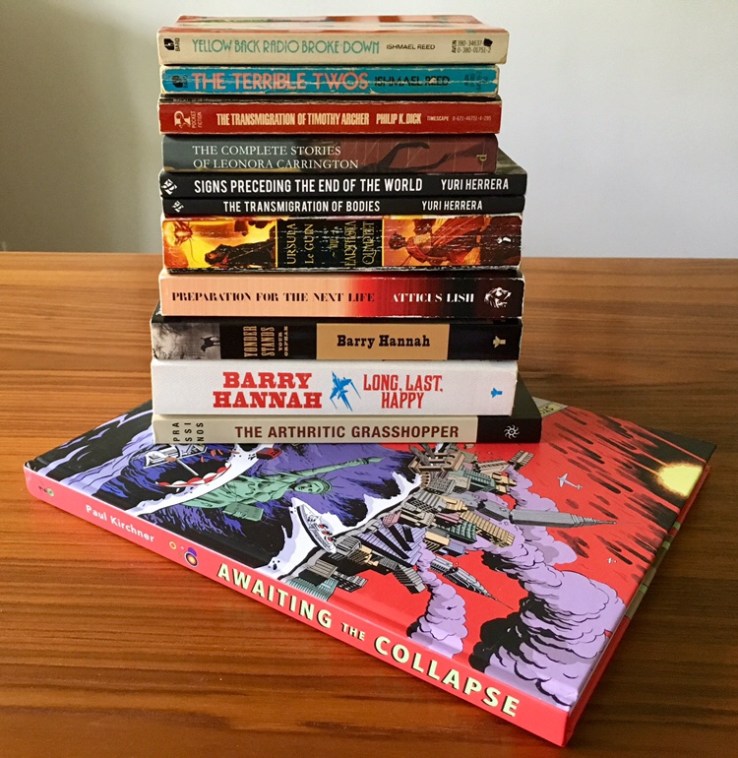
Hi! Did anyone else experience 2017 as an overlong, poorly-conceived, cartoonishly bad, poorly-written dystopian novel?
With that out of the way, a few notes on some of my favorite reading experiences this year—a year I abandoned more books than I stuck with, a year I wrote fewer reviews on this site than ever, a year that I failed to write in full on some of the books I loved best. So, from the top of the pic to the bottom:
I read Ishmael Reed’s Neo-HooDoo Western revenge satire, Yellow Back Radio Broke-Down, at the beginning of the year, and his Christmas/plutocracy satire, The Terrible Twos, near the middle. Even though the novels were published in 1969 and 1982 (respectively), they capture, pin down, and tickle and torture everything that’s wrong about our current zeitgeist. Reed’s awful prescience shows that we repeatedly fail to learn from the past.
I read, reread, or audited over half a dozen Philip K. Dick novels this year. The Transmigration of Timothy Archer is in the stack because the blog actually reviewed it—and it was maybe my favorite, along with VALIS and Ubik.
The Complete Stories of Leonora Carrington has been a replenishing gift all year—something to dip into between novels, between projects and papers, a kind of surrealist palate cleanser. I still have about a dozen unread tales to savor later.
Yuri Herrera’s Kingdom Cons is not in the pic above, because I read a digital review copy. I included Signs and Bodies as visual placeholders though; as I wrote in my review:
I can’t help but think of Kingdom Cons as the third part of a loose trilogy that also includes Herrera’s previous novellas Signs Preceding the End of the World and The Transmigration of Bodies. All three are published by And Other Stories and all three are translated by Lisa Dillman, who conjures magic in translating Herrera’s neologisms, slang, and mythical tone. Kingdom Cons extends the mythic-noir mode that Signs initiated and Bodies continued. Herrera is a writer with a voice and a viewpoint, an author whose archetypal approach shows the deep significance to contemporary life’s concrete contours.
Herrera’s novel is, come to think of it, one of only two contemporary novels on this list that was actually published this year—and even then it’s a work in translation.
Also not in the picture (because I loaned it to someone who never returned it!), and ed in 2017 is Robert Coover’s novel Huck Out West a critique of Manifest Destiny that’s as timely as ever.
Also not in the picture because I read it as a (samizdat) ebook: Thomas S. Klise’s 1974 cult novel The Last Western. Any indie press that brings The Last Western back into print will find plenty of readers and champions for the book.
And also not in the stack picture because it’s an audiobook is my favorite audiobook I audiobooked in 2017, Arkady and Boris Strugatsky’s Roadside Picnic, translated by Olena Bormashenko, and read by Robert Forster. I audited it during Hurricane Irma—and then again, after.
Continuing down the stack: I’ve been going back through Ursula K. Le Guin’s Earthsea novels via audiobook. Sort of like literary comfort food.
Atticus Lish’s 2014 novel Preparation for the Next Life was the best novel I read in 2017. I sort of semi-reviewed it as I was reading it, writing:
Lish’s prose is amazingly concrete. He renders New York City (and the other settings) with seemingly effortless thoroughness; the evocation of place is vivid and refined in its attention to detail, but reads raw somehow. There’s a flavor of prime Denis Johnson or Don DeLillo here, but these comparisons aren’t fair: Lish is original—the prose reads thoroughly real, real to and from the author. The novel…strikes me as one of the most authentic “post-9/11” novels I’ve read. There’s almost something sci-fi to Preparation—Lish shows us our world through alien eyes that suck in every detail. I wish I’d read it sooner.
I read a lot of Barry Hannah over the summer, sucking it up like bourbon or grits or eggs but mostly like bourbon. Long Last Happy rehashes some greatest hits, and is a great place for anyone interested—but it also led me to his last stuff, which ended up being darker, danker, richer than I would have imagined. So then I read his last novel, Yonder Stands Your Orphan, which, fuck…
Gisèle Prassinos’ posthumous collection surreal poem-stories The Arthritic Grasshopper was another weird revelation in 2017, a thing I didn’t know I didn’t know about. In my review, I wrote:
Prassinos’s anti-fables offer ways of reading a mind that doesn’t know what it knows, of singing along with the free faceless astonishing voice.
At the bottom of the stack is Paul Kirchner’s Awating the Collapse. Peer closely enough at that back cover and you’ll get the whole mood of this post.
Anyway, I hope you read some good books this year, and I hope your 2018 is merry and bright and etc.


